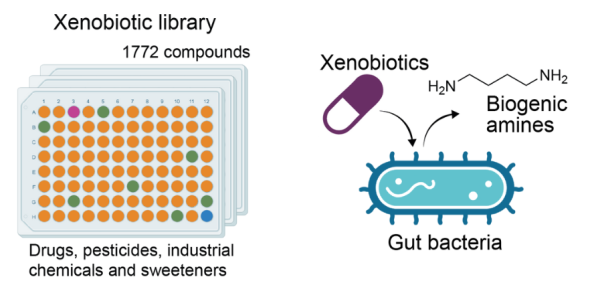
Submitted by Rachel Fellows on Mon, 30/06/2025 - 13:41
Scientists in the Patil lab at the MRC Toxicology Unit have identified that some drugs and environmental contaminants alter bacterial amine metabolism. Biogenic amines are linked to diseases including irritable bowel syndrome (IBS), neurological disorders and cancer. Understanding how amine production by bacteria is affected by molecules in our environment is therefore essential to learn how they affect our health.
The gut microbiome has a huge impact on our health, helping to digest our food, regulate our immune system and potentially even impact our mood. The small molecules known as metabolites that are released as part of a bacteria’s normal functions are one of the main ways that bacteria influence how the human body functions in health and disease.
Biogenic amines are molecules containing an amino group (-NH2) which are produced when carbon dioxide (CO2) is removed from amino acids, the building blocks of proteins. Whilst human cells can also produce amines, a large amount of these metabolites come from our gut bacteria. Amine production is part of the bacteria’s stress response allowing them to adapt to changes in pH (pH stress) or solute concentration (osmotic stress).
Amines are linked to both beneficial and harmful effects. Aromatic amines, which are amines containing a carbon ring, are linked to insulin resistance, serotonin production and stimulation of the central nervous system. Polyamines are another type of amine that impacts gut motility, gut barrier, the immune system and may even promote longevity.
Researchers performed the most comprehensive screen to date of non-biological compounds, also known as xenobiotics. They tested more than 1700 pharmaceutical drugs, sweeteners, pesticides, and industrial chemicals. They found that 16% of the xenobiotics they tested altered the production of biogenic amines by gut bacteria.
For certain bacteria such as Escherichia coli (E. coli), xenobiotic compounds including pesticides and non-antimicrobial drugs altered the production of polyamines. Beta-lactam antibiotics had the greatest effect. Dr Stephan Kamrad, first author of this study describes their findings, “Beta-lactam antibiotics had different effects on bacterial growth and amine production. Antibiotics increased polyamine production even at low concentrations where growth was only slightly decreased. This suggests that even small levels of non-biological substances could produce meaningful impacts on bacterial metabolism”.
Dr Kiran Patil, senior author of the report said, “As amines influence pathways involved in health and disease, these findings should be taken into consideration when determining the toxic effects of xenobiotics”.
The study, ‘Impact of drugs and environmental contaminants on amine production by gut bacteria’, was published in Molecular Systems Biology on the 30th June 2025. See the full article here: Impact of drugs and environmental contaminants on amine production by gut bacteria



